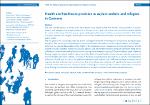Health and healthcare provision to asylum seekers and refugees in Germany
Frank, Laura
Yesil-Jürgens, Rahsan
Razum, Oliver
Bozorgmehr, Kayvan
Schenk, Liane
Gilsdorf, Andreas
Rommel, Alexander
Lampert, Thomas
The wars and devastation of recent years have driven many people to flee their homes. Great numbers of asylum seekers and refugees have sought protection in Europe. In 2015 and 2016 alone, over one million people applied for asylum in Germany. This has posed a great challenge for Germany’s healthcare provision facilities. The health of asylum seekers and refugees and the provision of their healthcare is therefore an important issue in terms of public health. The first part of this article describes the extent and legal framework of immigration to Germany during the past two years. The second part then discusses the issue of health and medical care for asylum seekers and refugees. Until now, no representative data on the health of this population exists. Studies so far have all relied on a small number of cases and been limited to particular regions and are therefore hard to compare. Moreover, there are no sufficiently standardised medical examinations during initial reception across all German federal states. Relevant findings suggest an urgent need to take action in the fields of mental health, chronic diseases and the provision of care to children of asylum seekers. A review of the data available proves the need for a national and systematic collection of valid data as a basis for adequate preventive and medical care. Different initiatives currently aim to improve the data collection basis in Germany. Over time, these new initiatives will significantly improve the data available on the health situation of asylum seekers and refugees in Germany. Once politics and broader society take these findings into account, this should contribute to an objective debate and evidence-based decisions.
Dateien zu dieser Publikation

